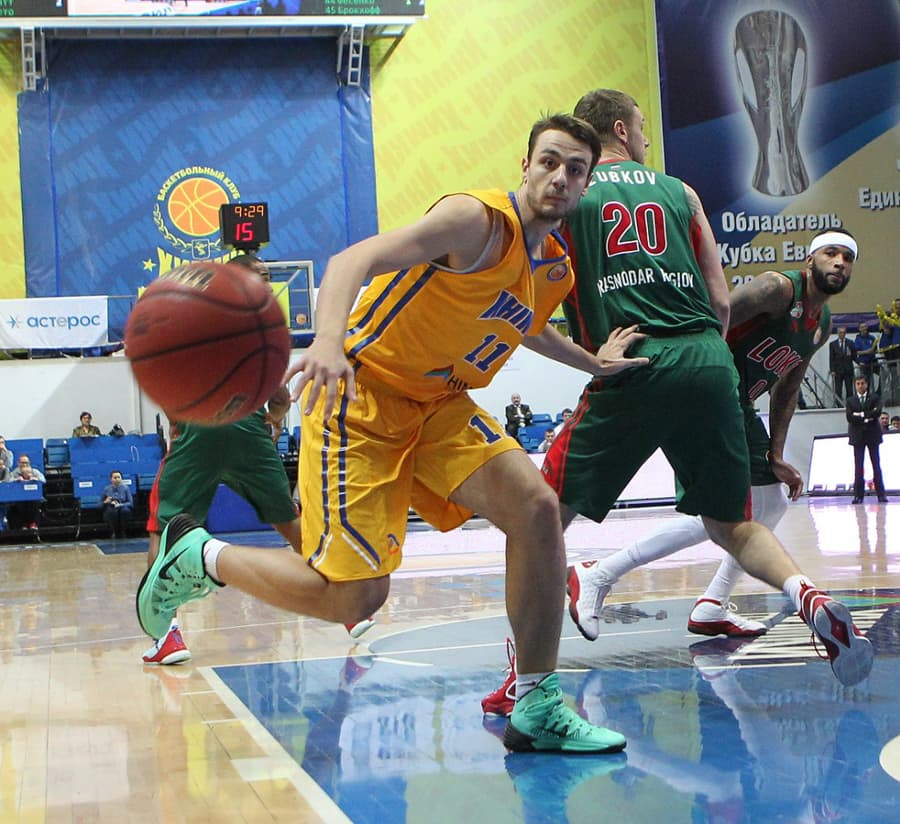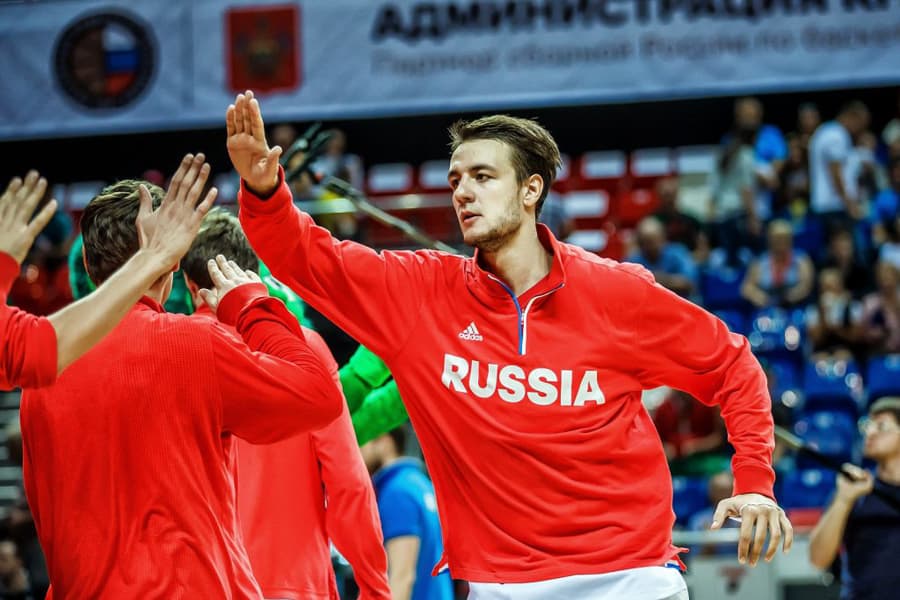Prior to Khimki – Loko, Vladimir Spivak shares the story of the hard-working Khimki forward with national team experience.
***
It’s the final minutes of Khimki’s tough Eurocup road game vs. Fuenlabrada. For one of Europe’s brightest clubs, known for its powerful rosters in recent years, things are a lot more difficult right now. A year ago, who would have thought Moscow Region would be forced to scramble for victory in a Madrid suburb under the bullets of a humble Spanish outfit? It seems like Carlos Cabesas and Marko Popovic were long in Khimki’s past, but now they’ve become Yellow-Blue ghosts of the good years. In this game, anyway, the celebrated Khimki veterans proved too much for the present roster.
But Khimki is easy to cheer for this season. Summer acquisitions were modest and Dusko Ivanovic isn’t afraid to use a lineup of Zaitcev, Vyaltsev, Ilnitsky, Monia, Sokolov. You might hurt yourself, trying to think of the last time Khimki relied directly on five Russian players. For now, it appears to be a forced measure, and things could change quickly. But we need to appreciate the moment.
This season, Khimki is living under Ivanovic’s military-style discipline–they were preparing for war, in any case, during the preseason. That’s how it is with this coach. Those who aren’t satisfied, desert. The system gives Russian players the best chance to step up: They are willing to sacrifice themselves and do what coach wants every single minute. That’s what a lot of coaches say: Russians at the elite level are terrific role players. And there’s someone on Khimki’s roster who could build a career as an absolutely ideal role player.

When Stanislav Ilnitsky started to get playing time under Rimas Kurtinaitis, many were surprised. But when Ivanovic arrived at Khimki, there was almost no doubt that Stas would play. Ilnitsky is very transparent on the topic:
– Every situation has its own story. But I think coaches like my approach to practice and games. And to doing what they want. Also, a lot of players avoid the dirty work. I’m not afraid of it. Taken together, each of these things play a part.
When Kurtinaitis was here, I knew what he wanted from me. That’s why I wasn’t too surprised when I got minutes. Plus, injuries to other players had an effect. I can play 3-4 positions. That really helped me. After Ivanovic’s arrival, I was able to adjust quickly and also got time. I try to do what the coach asks.
When you’ve got people like Rice and Shved on the team, somebody just needs to buckle down, play defense, take some hits, and grab rebounds. Ilnitsky does that with a veteran’s confidence, not demanding anything from his teammates on offense. After all, somebody has to simply execute plays, like coach wants.
Tyrese Rice admitted that Stas was one of his favorite teammates at Khimki.
– He works a lot and gets minutes because of his incredible attitude to the job. He does little things on the court that often go unnoticed: digs in on defense, crashes the glass with no fear, can knock down the open shot. He’s a great teammate.
The open 3-pointer is Stas’s most important and practically his only weapon on offense. There’s a lot of room to grow here. But so far, Ilnitsky hasn’t been asked to do much on offense.
– I always try to play defense. On offense, I struggled to make an impact, when I was playing alongside guys like Rice, Shved, Koponen. Moving forward, I want to do more on offense.
On that note, someone close to Ilnitsky is an example of how outstanding defense and big 3-pointers can make you a national team legend and European star. Sergey Monia, as everyone knows, demands a lot of his teammates, especially the young guys. But Stanislav says that Captain Russia is loyal to him, which is an accomplishment already.
– It’s really nice to play with Sergey, whether against each other in practice or on the same squad. In the locker room, he’s a good teammate. We have similar positions and I’m glad to learn from him. To be honest, Monia is nice to me. He’s always encouraging. The thing I hear most is that I should have shot the ball.
Ilnitsky was one of 12 players to make the national team roster this summer. He started by tearing up the RBF Open Camp, which featured the national team reserves. Then he took advantage of the deficit of small forwards on the national team and injuries. Ilnitsky hasn’t appeared on the court in official games, but Sergei Bazarevich named him the “ideal person for practice.” Regardless, Stas is only 22, and his debut on Russia’s team should happen soon.

Ilnitsky had at least one familiar face on the national team this summer. Alexey Shved is the idol of any kid from Belgorod that plays basketball and his dad, Viktor Nikolaevich, has become one of Russia’s top youth coaches. Tall people in Belgorod usually play volleyball, but this season there are four players from that city in the VTB United League.
– Viktor Nikolaevich is a very strong coach. – says Stas. I think he’s done a lot for basketball. As a kid, he instilled in me a professional approach to basketball. You couldn’t just miss practice, even when we were 9-10 years old.
Just like when he was 10 years old, Ilnitsky is a pro on the job. At the moment, his job is to be a role player for a rebuilding Khimki team. If someone can earn the title of “star role player,” there’s no reason Stas can’t do it.





















